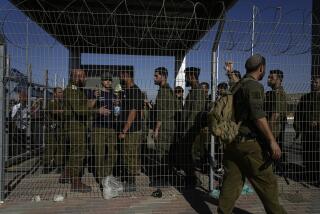Army Papers Show Abuse Case Closed Without a Full Inquiry
- Share via
WASHINGTON — The Army closed an investigation of an Iraqi detainee’s allegations of abuse last year even though no Americans involved in the case were questioned and related documents were declared lost in a computer malfunction, according to Pentagon records made public Thursday.
The Iraqi, whose full name was censored in the documents, is described as a relative of a former bodyguard for ousted President Saddam Hussein.
The detainee, captured Jan. 4, 2004, alleged that he was kicked in the stomach once and punched in the spine once by interrogators. He said he was placed in front of an air conditioner after being stripped and having a bag placed over his head. Cold water was poured over the bag every few minutes, he said, and he was dragged around a room by his arm.
The investigation documents were among thousands of pages of records released by the American Civil Liberties Union, which obtained them in a Freedom of Information request.
Army spokesman Paul Boyce said more than 500 investigations have been conducted on allegations of detainee abuse and that at least 251 military members have been court-martialed or otherwise punished.
“This effort by the U.S. Army Criminal Investigation Command demonstrates the Army’s continuing and tireless commitment to investigate any allegation of detainee abuse,” he said.
The documents include numerous references to investigators being blocked, yet the matter was closed on June 17, 2005.
A review that had led to the reopening of the probe early last year said the loss of records in a computer glitch was an unacceptable explanation.
An April 2005 report said an Army unit had been unable to fully investigate 23 criminal cases “due to the suspects’ and witnesses’ involvement in Special Access Programs and/or the security classification of the unit.” Special Access Programs are highly classified activities.
A February 2005 report said that even though the Iraqi had given a detailed description of possible suspects, “no effort was made to identify and interview the interrogators and screening personnel.”
An earlier report said, “The only names identified by this investigation were determined to be fake names utilized by the capturing soldiers,” yet it added that “necessary requirements” of the probe had been met. The records indicate that the use of fake names had been authorized.
More to Read
Sign up for Essential California
The most important California stories and recommendations in your inbox every morning.
You may occasionally receive promotional content from the Los Angeles Times.










